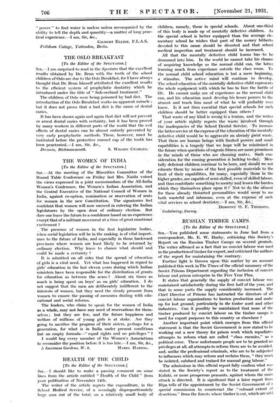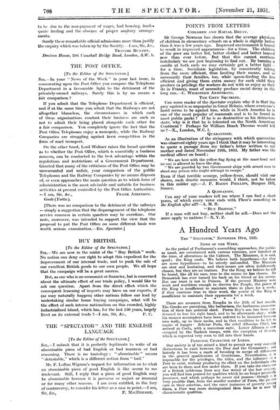RUSSIAN. TIMBER CAMPS.
. . [To the Editor of the SPECTATOR.]
Sol,—You - published some statements in 'June last from a correspondent, Mr. E. W. Harliy, criticizing -this • Society's Report on the Russian Timber -Camps on -'several grounds. The writer affirmed as a fact that no convict labour was used in the production of timber for export, and criticized the authors of the - report for maintaining: the contrary. -
Further light is thrown upon this matter by an account published this week-in The Times-of the official summary of the Soviet-Prisons-Department-regarding the inclusion of- convict labour and prison enterprise in the-Five Year Plan.
- It states that generally the supply of convict labour was maintained satisfactorily- during-the first half of the year, and '
that in some parts the supply considerably increased. The Chief Director 'of -Prisoni has instructed- the directors of all convict labour organizations to hasten production and make up for lost ground; particularly in the timber work and other industries.- - Can it posSibly be' maintained that none of the timber produced by convict labour on the timber camps is used for export purposes to this. country or elsewhere ?
Another important point which emerges from this official statement is that the Soviet Government is now stated to be working out a new theory for prison work which repudiates attempts to reform what are called " class enemies," as a political error. These unfortunate people are to be granted no privileges at all, all attempts to reform them are to be avoided. and, unlike the professional criminals, who are to be subjected to influences which may reform and reclaim them, " they must be isolated, subdued and trained for manual gang labour."
The admissions in this official report fully confirm what was stated in the Society's report as to the treatment of the Kulaki, or more prosperous peasants, against whom the main attack is directed. It is significant that a later report from Riga tells of the appointment by the Soviet Government of a special commission to counteract the ;" colossal extent of - desertions " from the forests where timber is cut, which are said to be due to the non-payment of wages, bad housing, inades quate feeding and the absence of proper sanitary arrange- ments.
Surely these remarkable nfficial admissions more than justify the enquiry which was taken up by the Society.-1 am, Sir, &e.,

































































 Previous page
Previous page